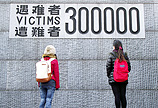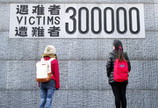

 Two national memorial days are to be marked, according to draft resolutions being reviewed by the top legislature.
Two national memorial days are to be marked, according to draft resolutions being reviewed by the top legislature.
 The brutalities committed by the Japanese invaders left a lasting scar in the hearts of the Chinese people.
The brutalities committed by the Japanese invaders left a lasting scar in the hearts of the Chinese people.
A Chinese spokeswoman on Tuesday hit back at Japanese criticism regarding China's military expansion and demanded Japanese leaders confess to a recent string of controversial moves.
A Chinese spokeswoman on Tuesday urged Japan to stick to the path of peaceful development as the Japanese cabinet plans to ease its self-imposed restrictions on arms exports by not ruling out delivering weapons to nations involved in international conflicts.
Japan must correctly look at China’s move to establish the two memorial and commemorative days and own up to its past, Qu said.
Chinese lawmakers are mulling making December 13 a national memorial day to commemorate those killed by Japanese aggressors during the Nanjing Massacre in the 1930s.
 China's top legislature is considering designating Sept 3 as the Victory Day of the anti-Japanese War, and Dec 13 as the Nanjing Massacre memorial day.
China's top legislature is considering designating Sept 3 as the Victory Day of the anti-Japanese War, and Dec 13 as the Nanjing Massacre memorial day.
During the Japanese occupation of China, an estimated 30 million Chinese were killed. In the Rape of Nanking or Nanking Massacre, at least 369,366 people were slaughtered and 80,000 women were raped by Japanese invasion troops.
 September 18, 1931
September 18, 1931
Japanese troops provocatively destroyed a section of railway in north Shenyang and attacked the Chinese garrison at Beidaying, Shenyang, on the same night, this led to the "September 18th incident."
September 19, 1931
In the morning, the Japanese army occupied Shenyang. Because the Kuomintang government ordered "nonresistance," the Japanese forces occupied major cities and towns in Liaoning province in few days.
September 23, 1931
Chiang Kai-shek gave a speech in which he went so far as to order the army and the people to "take the rough with the smooth and wait for the judgment of the League of Nations."
The Japanese aggression caused 35 million deaths and casualties of Chinese people and US$600 billion of economic losses in China. China won the war eight years later.
China has urged the Japanese government to make clear its stance on right-wing activists' latest pro-nuclear weapons statements.
 Beijing called upon Tokyo on Monday to make the "security concerns of Asian neighbors" a priority in response to Japan's government drafting new principles on arms exports.
Beijing called upon Tokyo on Monday to make the "security concerns of Asian neighbors" a priority in response to Japan's government drafting new principles on arms exports.